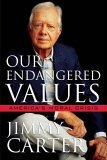Whatever his "vision" was it has not been clearly articulated, and if it had to do with bettering our society as a whole, certainly not implemented.
I think back to FDR and his Brain Trust creating the New Deal, Lyndon and Lady Bird Johnson and their vision of "The Great Society", and Jimmy Carter with his quiet, humble, intelligence.
FDR was smart enough to set up the Brain Trust to get input from people with a variety of ideologies. George Bush on the other hand, has surrounded himself (or allowed himself to be surrounded) by undifferentiated power brokers. He has eliminated consultation with his own father's National Security Advisor, Brent Scowcroft. You can read about the split in this article from the The New Yorker. Although Scowcroft favored sending American troops to Iraq, after Saddam Hussain's 1990 invasion of Kuwait, he reportedly told George H. Bush that, "An American occupation of Iraq would be politically and militarily untenable" which probably makes him a less than popular dinner guest at the Bush White House.
Compare part of a speech LBJ gave in 1964 to any "vision" you've heard from George Bush or his administration -
"The Great Society rests on abundance and liberty for all. It demands an end to poverty and racial injustice, to which we are totally committed in our time. But that is just the beginning.
The Great Society is a place where every child can find knowledge to enrich his mind and to enlarge his talents. It is a place where leisure is a welcome chance to build and reflect, not a feared cause of boredom and restlessness. It is a place where the city of man serves not only the needs of the body and the demands of commerce but the desire for beauty and the hunger for community.
It is a place where man can renew contact with nature. It is a place which honors creation for its own sake and for what it adds to the understanding of the race. It is a place where men are more concerned with the quality of their goals than the quantity of their goods."
Jimmy Carter, a deeply religious man, who once answered yes, when asked if he was a "Born Again Christian" (he admits that was a mistake now), is concerned with the erosion of the wall separating Church and State that has occurred in our country in the last five years.
The idea that the government is charged with defining and enforcing personal morals, the elimination of the ban on assault weapons in 2004, the infringement on civil liberty and personal privacy in the name of the Patriot Act, are all distasteful to this honorable man, and it would seem safe to say, the majority of Americans.
You can listen to Jimmy Carter talk about these things in this interview with Terry Gross on NPR A Former President Warns of 'Endangered Values'.
FDR was a well educated attorney before he entered politics and worked his way up the political ladder as a New York Senator, Assistant Secretary of the Navy, Democratic nominee for Vice President, Governor of New York and finally president. Looking at what George Bush has before him seems quite tame compared to the circumstances FDR had facing him, both personally - suffering from polio, unable to walk, and as our national leader - dealing with the Great Depression with 13,000,000 people unemployed early in his first term, then World War II and Pearl Harbor.
LBJ graduated from high school, didn't think he wanted to attend college and worked as a laborer for awhile, returned to college and worked as a teacher (the high school debate team he taught won the state championship), before entering politics and working his way up the political chain (some say the ultimate politician in that he knew how to get things done). He used his political skills to accomplish things that helped the country in the areas of education, the environment and civil rights.
Jimmy Carter graduated from Annapolis, was the commander of a U.S. Navy Nuclear submarine, a farmer, a governor and willing to propose unpopular, but necessary priorities, like - conserving energy. President Carter coordinated a law to raise minimum automobile fuel efficiency from 12 to 27.5 mpg. That policy was terminated by Ronald Reagan. George Bush is unwilling to bring up any discussion of required raises to minimum fuel efficiency for automobiles.
George W. Bush's main claim to fame is that he is the son of George Herbert Walker Bush, defended Texas and Alabama during the Vietnam War, managed a baseball team, became governor of Texas and then president of the U.S.A.
I guess we shouldn't be surprised with where we are.
I try to stay out of political discussions for the most part nowadays, but I hope we can find a leader the next time around that understands something about history, can stand up for what is right for the powerless even if it means offending the powerful, and has the intellectual capability to articulate a clear policy for his adminstration to ensure we have a "government of the people, by the people and for the people".
The Gettysburg Address by Abraham Lincoln
